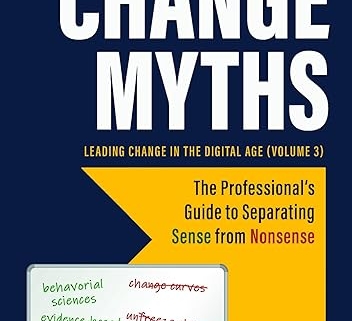Leadership Myths & the War on Truth
Paul Gibbons, thought leader and futurist on behavioral science, culture, leadership, and the future of work, shares this article as a companion to his podcast Leadership Myths & the War on Truth.
Listen to the companion interview and past episodes of Innovating Leadership: Co-Creating Our Future via Apple Podcasts, TuneIn, Spotify, Amazon Music, Audible, iHeartRADIO, and NPR One.
Change is painful, not just emotionally or metaphorically, but neurobiologically according to authors David Rock and Jeffrey Schwartz — two credentialled neuroscientists. They say, “Change is pain. Organizational change is unexpectedly difficult because it provokes sensations of physiological discomfort.”
Moreover, they add that the inevitable pain of change is a “hardwired” function of the human nervous system and that “brains hate change.”
The narrative that change is hard is deeply interwoven into change management and leadership. You probably believe that because that is what is taught in every course on change. Moreover, it jibes with our intuition — we remember difficult life changes.
Neuroscience, we now hear, backs our intuitions up. Whew! There is a satisfying “click” when our intuition and new inputs accord.
The critical thinker double-checks their intuition, knowing that our minds are susceptible to priming and other biases. When we encounter the idea that brains hate change, priming guides our memory toward painful examples, like the breakup, the unfamiliar new school, or pulling up stakes and moving to a new city.
One cognitive bias, the positive-negative asymmetry effect, makes this worse. The psychological effects of negative events tend to outweigh those of positive events. We remember the breakup, the downsized job, and the stranger in the new school events much more saliently than a sunset walk with a loved one.
Business gurus are also adept at emotive metaphor — that is how they become gurus. “Brains hate change” is a metaphor because brains, as entities, do not “hate” anything. The brain itself feels no pain — there are no nociceptors in neural tissue (there are in the scalp, of course).
“Hate” is a narrative, and narratives are “added” to physiological sensations as a sense-making tool. The physiological experience of a roller-coaster ride is similar in a person who finds it thrilling (one narrative) and a person who is scared to death (a different narrative).
While this may seem hair-splitting, it matters because we have considerable power over narratives but considerably less over neurochemistry. While certain parts of the brain are activated when shown an image of a jilting ex-lover, those same parts (the putamen and insular cortex) share “circuitry” (another metaphor) with the “love circuit.” When “triggered” (another metaphor), we can create a hate narrative or another (say forgiveness or gratitude).
(This brief excerpt was from Chapter X of Change Myths: The Professional’s Guide to Separating Sense from Nonsense)
ABOUT THE AUTHOR:
Paul Gibbons was most recently a partner at IBM Consulting — a thought leader and futurist on behavioral science, culture, leadership, and the future of work. He previously advised PricewaterhouseCoopers (PwC), KPMG, and Deloitte on talent, culture, and leadership. He previously authored five books, most prominently The Science of Organizational Change and Impact, the first two books in the Leading Change in the Digital Age series. Those books birthed the conversation about change mythology. The first volume of his Humanizing Business series, The Spirituality of Work and Leadership, was published in 2021.
Thank you for reading Innovative Leadership Insights, where we bring you thought leaders and innovative ideas on leadership topics each week.
ADDITIONAL RESOURCES:
Ready to measure your leadership skills? Complete your complimentary assessment through the Innovative Leadership Institute. Learn the 7 leadership skills required to succeed during disruption and innovation.
- Follow the Innovative Leadership Institute LinkedIn page
- Subscribe to Innovating Leadership and listen on your favorite podcast platform
- Subscribe to our blog – Insights
Check out the companion interview and past episodes of Innovating Leadership: Co-Creating Our Future on your favorite podcast platform, including Apple Podcasts, TuneIn, Spotify, Amazon Music, Audible, iHeartRADIO, and NPR One.


Leave a Reply
Want to join the discussion?Feel free to contribute!